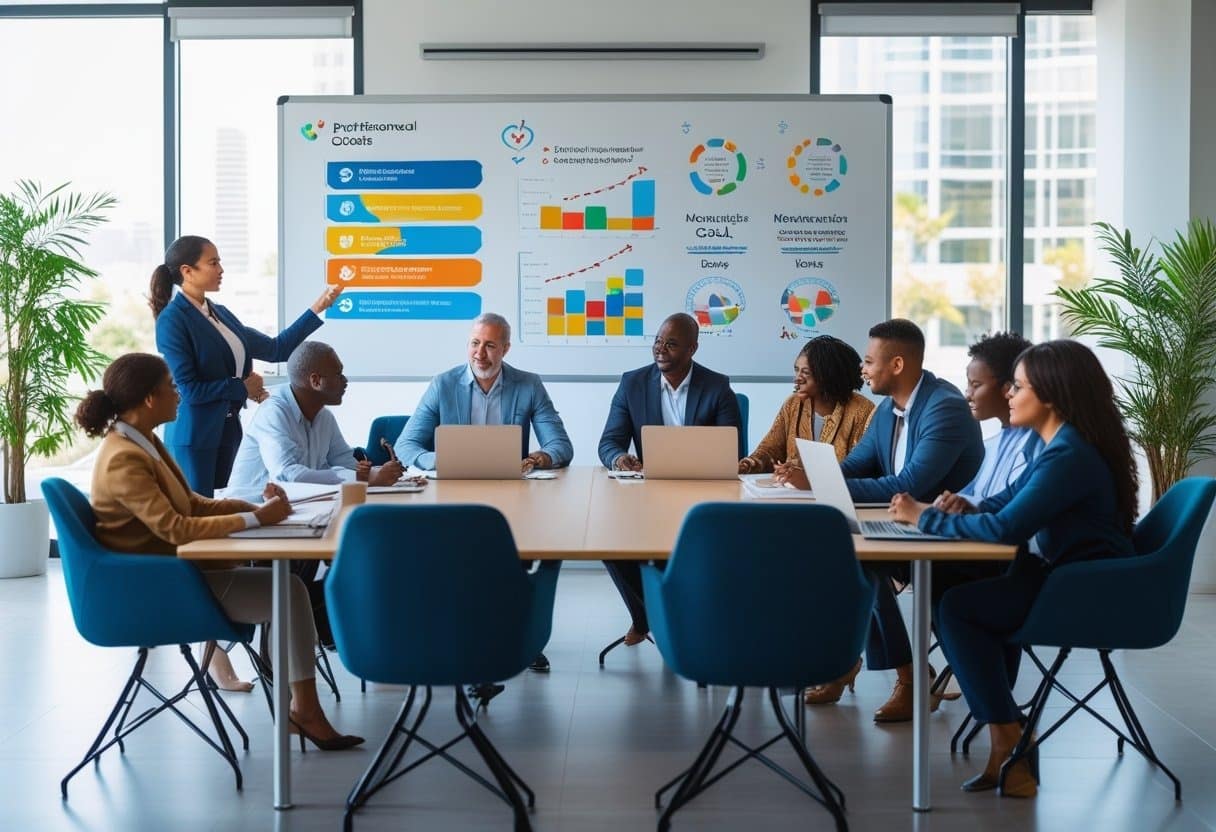
Personal development is more than a trend; it gives individuals a path to real progress in work, relationships, and happiness. Research shows that those who invest in self-improvement often see greater resilience and achievement. Simple actions like setting aside time for reading or attending workshops can help people overcome challenges and break through limits. To learn more about building confidence and growth, learning about the importance of personal development offers helpful strategies.
Key Takeaways
- Personal development leads to growth and confidence
- Setting clear goals helps drive self-improvement
- Learning new skills opens doors to new opportunities
Understanding personal development
Personal development means making thoughtful changes to learn and grow in life. It can include skills such as self-reflection and goal setting, and tools like journals, apps, or books. Many people start this journey to better understand themselves and unlock their full potential, as explained in the idea of a journey of self-discovery.
A simple table for personal growth actions:
| Action | Example Tool |
|---|---|
| Setting goals | Habit tracker app |
| Practicing reflection | Journal |
| Building self-awareness | Self-awareness exercises |
Small steps such as reading, mindfulness, and talking with mentors help individuals gain new skills and confidence.
Advantages of Growing Personally
Personal development gives people the chance to find their real interests and talents. By knowing what they love and are good at, people can set goals that match their true selves. Writing in a journal or using apps like Habitica and Notion can help track progress and spark self-discovery.
Improved confidence is a big reward of personal development. When someone learns new things or takes on a challenge, they start to believe more in their abilities. Goal setting and daily affirmations are tools that can help boost self-confidence.
| Benefit | Practical Example |
|---|---|
| Greater happiness | Practicing gratitude daily |
| More job opportunities | Taking additional training courses |
| Less stress | Doing regular mindfulness |
Building positive habits, such as taking time for self-care, can lead to less worry and more joy. Reading books like “Atomic Habits” or trying out guided meditation apps can also make a big difference.
Those who focus on self-development strategies often feel more prepared to face life’s ups and downs. Even small steps, like setting weekly goals or reflecting each night, can lead to lasting results.
The science behind personal development

Research shows that working on personal growth can lead to greater happiness and healthier minds. When a person sets goals or tries positive habits, the brain releases chemicals that lift mood and boost motivation. For example, dopamine is released when learning a new skill, bringing a sense of reward.
Brain experts have found that neuroplasticity—the brain's ability to change—lets people build new habits and even change how they think. For instance, using a daily journal or habit tracker app can help start these changes. A quick look at positive actions:
| Activity | Brain Change | Example App |
|---|---|---|
| Practicing gratitude | More positive thinking | Gratitude Journal |
| Learning a new skill | Sharper focus | Duolingo |
| Setting small goals | More motivation | Habitica |
Trying out activities like reading Atomic Habits or exploring positive thinking can make a real difference. People of all ages can improve how they feel and think by taking small but steady steps every day.
Creating Goals for Personal Growth

He or she begins by listing parts of life to improve, like health, friendships, or communication. Using a free template or a popular app such as Trello or Notion keeps progress organized. Studies show that people with SMART goals are 40% more likely to succeed, as SMART keeps goals specific and trackable.
An easy table example of Goal vs. Milestone:
| Goal | Milestone |
|---|---|
| Improve public speaking | Give one speech next month |
| Build confidence | Join a new club |
As each small milestone is reached, celebrating even simple wins boosts self-esteem and keeps motivation strong.
Making a Roadmap for Self-Improvement
A good personal plan starts with knowing personal strengths and weaknesses. For example, someone strong in teamwork but weak in time management might set a goal to improve their productivity. They could use helpful guides such as highly rated productivity books or apps like Todoist for tracking daily progress.
A table of action steps might look like this:
| Goal | Action Step | Resource | Deadline |
|---|---|---|---|
| Improve time management | Complete free webinar | Online course | 2 weeks |
| Build communication | Practice weekly talks | Mentor | 1 month |
Setting clear timelines for each step makes it easier to follow through and check progress. Regular check-ins boost motivation and help people adjust their plans as they learn what works best for them.
Research shows that those who invest in self-improvement often see greater resilience and achievement, as supported by findings in the Journal of Happiness Studies.
Techniques for personal growth and self-improvement
Growing as a person is often a step-by-step journey that can be made smoother with certain techniques and practical habits. Many people find it helpful to keep learning new skills and knowledge throughout life. This can mean reading personal development books, listening to educational podcasts, or signing up for online classes. Some apps, such as language learners or journaling tools, make learning more engaging and accessible.
Self-reflection is also key. By setting aside time for mindful practices like meditation, individuals can better understand their habits and feelings. A simple way to start is through daily journaling or using guided recordings for mindfulness meditation. There are resources for those interested in learning more about mindfulness meditation and how regular use can boost focus and reduce stress.
Another crucial strategy is teaming up with a friend or group for accountability, which helps keep motivation high. Sharing goals and celebrating small wins together encourages consistency. The table below highlights easy ways to start:
| Action Step | Tool/App |
|---|---|
| Set learning goals | Skillshare, Coursera |
| Track mood and habits | Daylio, Habitica |
| Practice meditation | Headspace, Calm |
| Join growth-minded groups | Meetup |
Healthy habits matter, too. Getting enough sleep, eating a balanced diet, and exercising boost both mental and physical growth. Even small actions, like joining a morning walking group or prepping healthy snacks, can have a big impact.
Getting involved in networking gives people a chance to meet new friends who also value personal growth. Attending workshops or joining online groups can open up new paths for self-discovery, especially when trying out self-discovery activities. Starting with just one new positive habit or activity can be the beginning of meaningful change.
Ways to Move Past Growth Barriers
Facing setbacks is common while working on personal development. Many people experience a fear of failure, which may stop them from taking important steps forward. Failure can be used as a learning tool. Even famous thinkers and inventors failed many times before finding success.
Keeping discipline is another challenge for many. Building small routines, using apps like Habitica or Todoist, and tracking progress can make it easier to stick to new habits. A consistent schedule and a clear plan help with staying on track.
Negative self-talk can hold someone back by lowering confidence. Studies show repeating positive affirmations can help create a growth mindset. Keeping a journal for positive thoughts or reading books like "Mindset" by Carol Dweck can also support this change.
Procrastination is a barrier that leads to lost opportunities. Breaking large tasks into smaller parts and using checklists can help someone start, especially when paired with setting quick deadlines. Methods for overcoming procrastination include time-blocking and the two-minute rule.
| Challenge | Simple Solution | Helpful Tool |
|---|---|---|
| Fear of failure | Learn from mistakes | Growth journal |
| Lack of discipline | Build daily routines and reminders | Productivity apps |
| Negative self-talk | Practice daily affirmations | Inspirational books |
| Procrastination | Break tasks and use short deadlines | Task managers |
Anyone can take small actions each day to push past these roadblocks and build a strong foundation for future growth. Those who keep going, even during tough times, are more likely to succeed, and they can learn more about mastering resilience along the way.
How Mindset Shapes Personal Growth
A positive mindset helps individuals see mistakes as lessons instead of failures. Studies show that students with a growth mindset can improve grades by up to 30%. Tools like journaling apps or progress charts make it easier to track changes in thinking and behavior.
Action Steps to Strengthen Mindset:
- Reframe negative thoughts into positive ones
- Practice self-reflection with helpful self-worth questions
- Try reading top-rated mindset books for inspiration
- Celebrate small wins daily
| Fixed Mindset | Growth Mindset |
|---|---|
| Avoids challenges | Embraces challenges |
| Gives up easily | Keeps trying |
| Ignores feedback | Seeks feedback |
Recommended Resources for Personal Development
Top Books to Read
Books can offer real-life examples and steps for growth. Favorites like Atomic Habits and Mindset give readers ways to change their habits and thinking. For those looking to learn more, popular titles and self-awareness books provide helpful tools for self-discovery. A short daily reading habit—just 10 minutes—can create new perspectives over time.
| Title | Main Focus |
|---|---|
| Atomic Habits | Building good habits |
| The 7 Habits of Highly Effective People | Personal success |
| Mindset | Growth thinking |
Great Online Learning Options
Websites like Coursera and LinkedIn Learning let anyone access personal development courses at their own pace, offering structured programs taught by industry experts. These platforms cover popular topics including communication skills, time management, and setting goals. Most courses have video lessons, quizzes, and action steps for practice.
Try a free course for a gentle start, or use apps to track your skill-building journey.
Must-Listen Podcasts for Growth
Podcasts bring expert interviews and real stories right to your phone. Top-rated personal growth podcasts, including The Diary of CEO and The Tony Robbins Podcast, motivate listeners to take action. More ideas can be found among inspiring personal growth podcasts perfect for listening during daily routines.
Example: Listen to a new episode in the car or during a morning walk to add learning to your day.
Helpful Coaches and Mentors
One-on-one coaching or finding a mentor gives real feedback and support. A mentor helps set clear, achievable goals and keeps one motivated through challenges. Many coaches use tools like progress checklists or specialized self-reflection exercises to guide personal growth. Even a few sessions can spark lasting improvement.
Frequently Asked Questions
How Does Personal Growth Change Someone’s Life?
Personal growth can help bring positive change to many parts of life. For example, people often gain more confidence, better health habits, and stronger relationships. According to a recent survey, over 70% of people who worked on personal development reported feeling happier. Using free tools like journaling apps or reading inspiring books such as Atomic Habits by James Clear can make these changes easier to start.
What Advantages Does Self-Improvement Offer at Work?
Personal development at work leads to clearer communication, problem-solving, and leadership. Employees who focus on growth often get more job offers and promotions. Companies value workers who are always learning. A simple action step is making a list of professional skills to improve. Workshops, courses, and books like Mindset by Carol Dweck can push a career forward. Learn more about workplace benefits of self-improvement at this guide on personal development in the workplace.
How Can Students Benefit from Working on Themselves?
When students focus on self-improvement, they become more organized, motivated, and ready for challenges. Good habits like setting goals, tracking progress, and learning time management make school easier. For example, students using a free planner app have been shown to complete more assignments on time. Here’s a quick table of helpful tools:
| Tool | Benefit |
|---|---|
| Quizlet | Improve study skills |
| Google Calendar | Organize tasks |
| Pomodoro Timer | Boost focus |
What are the First Steps to Starting Personal Growth?
Beginning personal development starts by figuring out which area of life needs attention. People can:
- Write down strengths and weaknesses.
- Set one clear goal.
- Track progress with a simple checklist.
Reading beginner-friendly books like The 7 Habits of Highly Effective People can help someone understand what to work on first.
Why is a Growth Plan Important for Success?
A clear plan sets the path for real change. It helps people:
- Stay organized
- Measure progress
- Avoid feeling lost
Research shows that those who make written plans are more likely to reach their goals, according to the American Psychological Association.
How Do Self-Improvement Activities Boost Health and Happiness?
Simple activities like walking daily, reading, or journaling can lower stress and build a more positive mindset. They help the brain and body work better. In a study, people who spent 10 minutes a day on self-care were less likely to feel burned out. Meditation apps, gratitude journals, or even learning a new skill online are good places to start.
